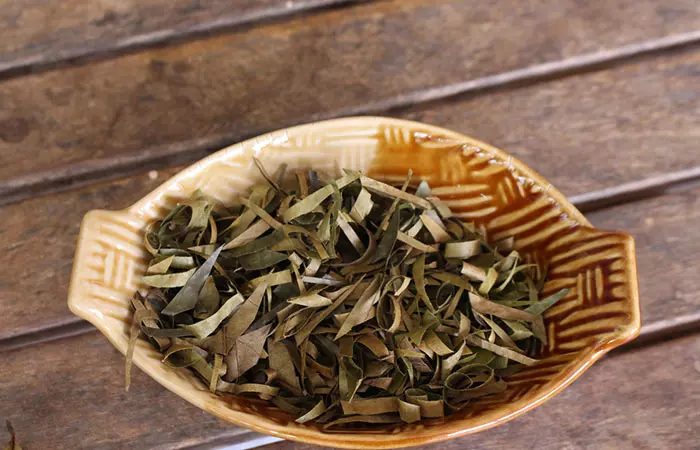Soursop leaves are rich in nutrients and used as a natural remedy for various ailments. Learn more about these leaves and whether their claimed benefits are real or not from the article below. Keep reading to know more!
What Are Soursop Leaves?
Soursop (Annona muricata), also known as Graviola or Brazilian paw-paw, is a flowering evergreen tree. It is native to Central America, Mexico, Cuba, and parts of India. It is now widely distributed from southeastern China to Australia and Eastern and Western Africa. Who Can Use It? It is suitable for everyone. How Often? Consume once or twice weekly for general health advantages. It is best to seek professional guidance while using it to treat particular health issues. Caution May result in neuron dysfunction and drastically lower blood pressure, hence pregnant or breastfeeding persons should avoid it as well as hypotension patients.
Traditional medicine uses soursop leaves for treating several diseases and ailments. This plant is primarily used for treating inflammation, rheumatism, hypertension, diabetes, parasitic infections, and other similar conditions (2). The soursop fruit is edible and has good therapeutic value. Soursop benefits your overall health in many ways and it is also popular as an anti-arthritic agent. Its extracts fight parasitic and worm infections. The leaves work on treating hypoglycemia and inflammation and also possess antispasmodic properties (2). These benefits of soursop can be attributed to the plant’s metabolites. Saponins, alkaloids, coumarins, terpenoids, tannins, and several other active phytochemicals have been identified in this miracle plant. In the following section, we will look at the possible health benefits of soursop leaves.
What Are The Health Benefits Of Soursop Leaves?
The leaves of the soursop plant are well-known anti-inflammatory agents. They also have antipyretici A medical substance that helps reduce or control fever with headache, cough, runny nose, and sneezing. , antimicrobial, antidiabetic, cardioprotective, and anti-parasitic properties. Soursop extracts can positively affect the vital systems in your body.
1. May Aid Cancer Treatment
Studies demonstrate antiproliferativei A medical substance that suppresses the growth of malignant or cancerous cells into the surrounding tissue. and cytotoxici A process that causes cells to die. It is often used to kill toxic cells in the body to protect it, for example, in the treatment of cancer. effects of the extracts of soursop plant against cancers of the breast, colon, prostate, respiratory organs, blood, liver, cervix, ovary, the mouth, and the skin (3). The active bio ingredients that may be beneficial are called annonaceous acetogenins (AGEs). These AGEs are involved in the anticancer properties of soursop. They kill cancer cells by inhibiting the mitochondrial complex I, a cancer cell protein (2). However, more rigorous studies are needed to confirm the safety and effectiveness of soursop and its leaves (3).
2. May Control Inflammation
Studies have identified more than 117 compounds in soursop leaves that have anti-inflammatory properties. More research studies are required to understand the leaves’ anti-inflammatory effects (4). The leaf extracts of soursop showed anti-inflammatory, antioxidant, and wound-healing properties in rat studies (5). The decoction of the leaves is applied topically for its anti-rheumatic and neuralgici A tingling short-term sensation or pain along a nerve in the head or neck that is associated with conditions like diabetes. effects. It also reduces/heals abscesses and wounds. The leaf extracts can relieve inflammatory conditions like cystitis, rheumatismi It occurs when the immune system attacks healthy body tissues. Its symptoms include inflammation or pain in joints and muscles. , arthritic pain, fever, diarrhea, dysentery, malaria, parasites, and skin rashes (4). Soursop leaf extract inhibits inflammatory mediators like IL-6, TNF-α, IL-1β, and nitric oxide (NO). A dose of 100 mg/kg of this extract proved to be anti-nociceptive (blocking pain) in rats (4). The leaves could also heal ulcers, lesions, open wounds, and edema with almost no toxicity in rat studies (4).
3. May Help Treat Insomnia
Traditionally, soursop leaves have been used to treat insomnia (6). The leaves have a smooth muscle relaxant activity and act as sedatives. Taking a glass of soursop leaf tea may also help ease stress (7). Tia Dee, a vlogger, shared her experience about taking soursop tea to improve her sleep cycles. She said, “My nerves are basically hyperactive, so what soursop does is it helps calm your nerves, and again, anecdotal, but that’s been my experience (i).” She adds that drinking tea in the evenings helps her fall into a deep sleep.
4. May Help Regulate Diabetes Symptoms
Daily administration of 100 mg/kg of aqueous soursop extract to rats exhibited strong glycemic control. The leaves of the plant may help improve glucose metabolism (8). Prolonged soursop treatment (for 28 days) in the rats reduced blood glucose levels and serum creatinine levels. It also balanced the activity of liver enzymes (AST, ALT, etc.). The levels of total cholesterol and triglycerides were also restored (8).
5. May Possess Antiviral Properties
Soursop extracts show antiviral properties against selective viruses. The plant interferes with the replication of HIV-1 in the host cells. Also, these extracts keep the virus from attaching to the host cell. The bark and stem extracts of soursop were noted to act against herpes simplex virus (HSX) (7). Though there is no direct research indicating similar effects with the leaves, the results of the aforementioned research may be extrapolated to the leaves as well. The virucidal effect of the soursop plant could be attributed to its polyphenols (7).
6. May Protect Oral Health
Soursop leaves were found to be bactericidal and fungicidal. They inhibited the growth of Streptococcus mutans, Streptococcus mitis, Porphyromonas gingivalis, and Candida albicans (1). Studies show that soursop leaf extracts can be used against oral microbes to an extent. The extracts have antimicrobial and fungicidal properties (1). These strains were found to cause periodontitis, gingivitis, and other oral diseases. Lab experiments report an antimicrobial effect of the leaves. They were most potent against the fungus Candida albicans. These results show the potency of soursop leaves in treating oral disorders (1). Dr. Kasen Somana, a Digital Cosmetic Dentist, says, “These Annona muricata plants can effectively kill Staphylococcus aureus and cholera strains. You can cure gum diseases, tooth decay, and gingivitis by consuming soursop leaves.” Soursop leaves have a powerful phytochemical profile. In the following section, we will further look into the nutrients responsible for their benefits.
Phytochemical Composition Of Soursop Leaves
Soursop plants contain several kinds of phytochemicals, including alkaloids, phenolics, and terpenoids. However, a few species of soursop are rich sources of annonaceous acetogenin compounds (AGEs). AGEs are considered crucial for their antimicrobial, antiprotozoal, antiviral, and anthelmintic properties (6). Annomuricin, annomutacin, annohexocin, muricapentocin, anonaine, isolaureline, xylopine, gallic acid, epicatechin, quercetin, catechin, chlorogenic acid, kaempferol, annonamine, norcorydine, vomifoliol were identified in these leaves (6). They also contain rutin, blumenol, solamin, epomuricenin, reticuline, coreximine, coclaurine, stepharine, atherosperminine, and anomuricine. The seeds, fruits, roots, and other aerial parts contain these (and a few other) phytochemicals in varying proportions (6). Soursop leaf oils also contain sesquiterpenes. The most abundant compound is β-caryophyllene. These volatile oils have β-pinene, germacrene-D, α-pinene, β–elemene, δ-cadinene, epi-α-cadinol, and α-cadinol (6). A cognitive effect of all these phytochemicals results in the benefits discussed above. Here’s how you can use these leaves to reap their benefits.
How To Use Soursop Leaves
The best way to use these leaves is to brew tea with them. This is because there is no information on how safe it is to ingest raw soursop leaves. Does that mean you have to brew its tea only in a certain way? Well, not really. You can brew it in two ways:
1. Regular Brew For Flavor
If you are using whole soursop leaves, If you want to skip through these steps, just get the soursop tea bags here. Dip and enjoy!
2. Prolonged Brew For Health
To make it taste better, add about half a teaspoon of lime juice, 2-3 mint leaves, and some honey (if you want it sweet). Besides tea, you may also add a broth made of soursop leaves to smoothies. Simply blend the broth with any fruit of your choice to enhance your nutrient intake. You may also add it to soups. Learn one such recipe in the next section.
Soursop Leaf Recipe
Soursop Soup
What You Need
4 to 6 soursop leaves 1 cup diced green peppers 2 cups cubed zucchini 2 cups cubed summer squash 1 cup diced red peppers 1 cup quinoa 1 cup diced onions 2 cups cubed chayote squash 3 tablespoons onion powder 4 teaspoons sea salt 16 cups water (1 gallon) 2 cups chopped kale 1 tablespoon basil 1 tablespoon oregano 1 tablespoon minced fresh ginger 1/4 teaspoon cayenne
How To Prepare
What Are The Side Effects Of Soursop Leaves?
May Cause Neuron Dysfunction
Soursop and its leaves contain alkaloids. Studies show these may cause neuron dysfunction and degeneration in those with Parkinson’s syndrome (9), (10). Therefore, individuals with existing neurological conditions should always consult a healthcare professional before consuming soursop leaves.
May Lower Blood Pressure Way Too Much
The plant and its leaves may also lower blood pressure way too much (11). Hence, individuals on blood pressure-lowering medications must exercise caution. There is no set dose for soursop leaves/tea yet. Neither are there any reports of toxicity. Animal studies showed no signs of toxicity – even at doses as high as 2 g/kg (12). However, we suggest you talk to your healthcare provider about the dosage. Is soursop acidic or alkaline? The following infographic will tell you everything you need to know about the various benefits of soursop leaves. Check it out! Illustration: StyleCraze Design Team Soursop has an acidic pH of about 4.1 to 4.8 (13). Is soursop good for sperm? There is insufficient scientific evidence to suggest that soursop has an effect on spermatozoa. How do you store soursop leaves? Store soursop leaves in a cool, dry place. If they are packaged, check the label for storage instructions. Is soursop leaf tea good for nerves? Possibly not. Soursop contains specific alkaloids that may lead to nervous disorders (14). Can soursop leaves help with weight loss? Soursop may prevent body fat accumulation which could lead to weight loss and help those with obesity (15). However, there is limited scientific research available to support the use of soursop leaves for weight loss. Discover 9 incredible health benefits of soursop leaves and juice. Learn how this amazing fruit can help improve your health and well-being from the video below. i. Fibro Friday | My Favorite Tea for Better Sleep | Soursop Tea for Nerves |https://www.youtube.com/watch?v=TfjCsAqtkq4












